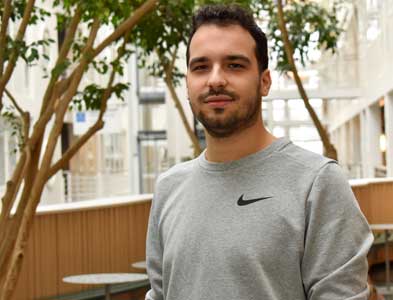New cybersecurity analysis solution leads to significant reduction in energy consumption

By offloading calculations for complex cybersecurity analyses to network accelerators, energy consumption can be reduced by over 30 times, according to Mariano Scazzariello, a postdoctoral researcher at KTH Royal Institute of Technology. This is an essential piece of the puzzle as internet traffic continues to grow, requiring more and more power for processing.
”It indicates a shift towards more sustainable practices," he says.
In recent years, internet traffic has grown by as much as 25 percent annually, presenting many challenges. Energy is needed not only to move traffic to and from data centres but also to operate these large data centres themselves. They store large amounts of data, including sensitive user information.
”There is a need for detailed analysis of internet traffic to identify malicious attacks and implement reactive countermeasures. Large-scale attacks can significantly damage societies and businesses, as we have seen recently with the attacks carried out."

Achieving both accuracy and efficiency
The current approach to analysing network traffic involves a trade-off between accuracy and energy costs to detect attacks. The analysis can be accurate but slow and energy-intensive when done on CPU-based servers, i.e. a processor, or it can be more efficient and environmentally friendly on network accelerators.
When performing analyses of high-speed network traffic on network accelerators, some approximate calculations can be made to maintain efficiency, but this can lead to some reduction in accuracy.
However, the work done by Mariano Scazzariello provides a solution that achieves both accuracy and efficiency. It does so by moving the calculations to network accelerators, a challenging task due to the need for more support from hardware manufacturers for complex operations.
Pushing boundaries
The research, Millions of Fast State Insertions on ASIC Switches , was awarded the ”Best paper award” at the ACM CoNEXT conference, one of the most prestigious international forums for networking research.
"We have shown the feasibility of building these essential building blocks to perform high-speed traffic analysis on energy-efficient network accelerators without sacrificing accuracy," says Mariano Scazzariello.
The findings push boundaries within cyber security traffic analysis. If implemented, the solution could reduce the need for regular servers in data centres, promoting sustainability through reduced energy consumption.
"In an era of increasing digitalisation, including the use of energy-intensive generative AI technologies, it is necessary to adopt strategies that steer us towards more sustainable practices," he says.
The research was conducted in collaboration with Marco Chiesa , associated professor at KTH, and Tommaso Caiazzi, a visiting doctoral student from Roma Tre University.
Text: Emelie Smedslund ( emeliesm@kth.se )
